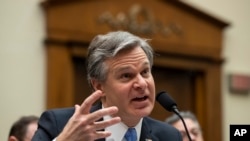United States officials are reporting an increase in Chinese economic espionage cases.
The Federal Bureau of Investigation has about 1,000 cases related to suspected Chinese theft of American intellectual property, U.S. officials announced last week. Officials said that they expect those investigations to lead to criminal charges against several people and businesses later this year.
The investigations involve all 56 Federal Bureau of Investigation (FBI) field offices across the country. They involve nearly every industry and part of the U.S. economy, noted FBI Director Christopher Wray.
He was speaking at a press conference about the Justice Department’s program to fight Chinese economic espionage.
"They're not just targeting defense sector companies," Wray said at the news conference, adding "they're also targeting…research at our universities."
The FBI's China-related investigations have grown over the past 20 years and are now at an all-time high, said John Brown. He is the assistant director for the FBI's counter-intelligence office. China-related arrests have also increased in recent years.
During a recent 12-month period, FBI agents arrested 24 people in China-related cases, U.S. records show. That is 15 more arrests than five years earlier. Since October 1, 2019, agents have made 19 more arrests.
The Justice Department announced action against China in 2018 after it found increasing evidence of Chinese economic espionage. Since then, the department has brought charges in more than 12 Chinese economic espionage cases.
Harvard professor arrested
Last month, the Department announced criminal charges against a Harvard University professor and two others in the Boston area. Charles Lieber was chairman of Harvard's Department of Chemistry and Chemical Biology. He was charged with lying to U.S. officials about his ties to China.
Speaking at the recent press conference, federal officials said they think more Chinese economic cases might be coming.
Andrew Lelling is the U.S. attorney for the District of Massachusetts. His office is representing the federal government in the Lieber case. Lelling says he expects to announce additional China cases out of Boston. The city and surrounding area are home to numerous well-known universities and research institutions.
Richard Donoghue is U.S. attorney for the Eastern District of New York. His office is prosecuting Huawei Technologies for intellectual property theft and violating U.S. sanctions on Iran. Donoghue said he expects an increase in Chinese intellectual theft-related cases, "not only of individuals but of companies."
“Prosecutions of individuals, prosecution of companies, outreach to (universities) and the technology industry, I think in the long run, that will lessen the chance for conflict between the United States and (China)," Donoghue said.
Lelling and Donoghue sit on the justice department's China Initiative working group. It was set up to prevent and prosecute thefts of American technology and intellectual property.
China denies it is involved in espionage or intellectual property theft.
The Justice Department's push to take action against those accused of espionage has swept up Chinese nationals and Chinese American researchers. That has led to criticism from Chinese American groups and universities concerned about protecting academic freedom.
But university and law enforcement officials say both sides are beginning to trust each other.
Mary Sue Coleman is president of the American Association of Universities. She said information from the Justice Department and the FBI helps university officials explain to professors and researchers that the threat is real.
I’m Susan Shand.
VOA’s Masood Farivar reported this story. Susan Shand adapted it for VOA Learning English. George Grow was the editor.
Write to us in the Comments Section or on our Facebook page.
_______________________________________________________________
Words in This Story
espionage – n. the act of spying or secretly gathering information
theft – n. the act of stealing
intellectual – adj. relating to ideas or the mind
sector – n. a part of an economy that includes certain kinds of jobs
attorney – n. a lawyer
counter-intelligence – adj. involving activities that are designed to limit spying or intelligence gathering
prosecute – v. to hold a trial against a person who is accused of a crime to see if that person is guilty
sanction – n. a threatened punishment for disobeying a rule or law
academic – adj. relating to schools or education





